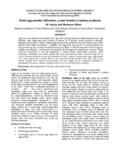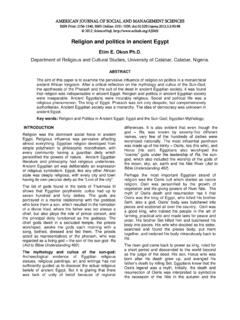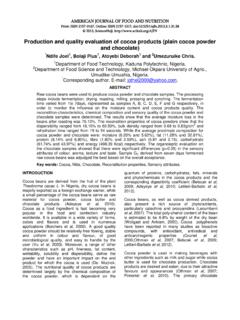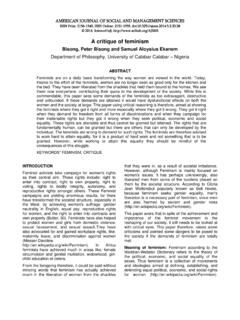Transcription of The influence of authoritative parenting style on ...
1 AMERICAN JOURNAL OF SOCIAL AND MANAGEMENT SCIENCES ISSN Print: 2156-1540, ISSN Online: 2151-1559, 2011, ScienceHu , The influence of authoritative parenting style on adolescents' academic achievement Kingsley Nyarko University of Ghana, Psychology Department, LG 84, Legon Ghana ABSTRACT The study was carried out to find out the influence of parental authoritativeness on adolescents academic achievement. As expected, the result shows that both mothers and fathers authoritativeness positively relate to the academic achievement of the students. The implications of the result are discussed.
2 Keywords: authoritative parenting , authoritarian parenting , permissive parenting , parenting style , academic achievement INTRODUCTION One of the most robust approaches in the development of children s social and academic achievement has been termed parenting style . In the scientific literature, there is ample evidence that insinuate that parenting styles are correlated with children s school achievement. For instance, Dornbusch, Ritter, Leiderman, Roberts, and Fraleigh (1987) found that inconsistency and mixed parenting styles are correlated with lower grades for adolescents.
3 Baumrind s (1971) seminal work on the classification of parenting styles has been essential in influencing research on parenting and its effect on children and adolescents. In her work she identified three types of parenting styles : authoritative , authoritarian, and permissive. According to her, authoritative parenting which comprises emotional support, high standards, appropriate autonomy granting, and unequivocal, bidirectional communication has been shown to help children and adolescents develop an instrumental competence distinguished by the balancing of societal and personal needs and responsibilities (Baumrind, 1989, 1991a; cited in Darling & Steinberg, 1993).
4 parenting style focuses on two major elements of parenting : parental responsiveness and parental demandingness (Maccoby & Martin, 1983). Parental responsiveness (parental warmth or supportiveness) refers to the extent to which parents intentionally foster individuality, self -regulation, and self -assertion by being attuned, supportive, and acquiescent to children s special needs and demands (Baumrind, 1991). Parental demandingness, on the other hand also referred to as behavioral control refers to the claims parents make on children to become integrated into the family, by their maturity demands, supervision, disciplinary efforts and willingness to confront the child who disobeys (Baumrind, 1991).
5 Several studies published shortly before the end of the 20th century examined the impacts of parenting styles on children s productivity, especially establishing the gains to children of authoritative parenting as juxtaposed to the negative outcomes produced by authoritarian and permissive parenting (Demo & Cox, 2000). Park and Bauer (2002) reported that a positive association exists between authoritative parenting style and academic achievement among Caucasians. authoritative parenting is a more flexible style of parenting in which parents permit their children considerable freedom, but are careful to provide reasons for the restrictions they impose and will ensure that the children follow these laid down procedures.
6 authoritative parents are responsive to their children s needs and ideas and will often seek their children s views in family deliberations and decisions (Baumrind, 1991; Weiss & Schwarz, 1996). Baumrind (1991) avers that, unlike any other pattern, authoritative generated competence and deterred problem behavior ( ). Bogenschneider, Small, and Tsay (1997), found that competent parenting is connected to warmer, more accepting, and more helpful styles of parenting . authoritative parenting has been found to be an essential factor in an adolescent s life in comparison with the other parenting styles .
7 It has been seen as the most effective in enhancing personal and social responsibilities in adolescents, without constraining their newly formed autonomy and individuality Am. J. Soc. Mgmt. Sci., 2011, 2(3): 278-282 279(Glasgow, Dornbusch, Troyer, Steinberg, & Ritter, 1997). Several studies have documented the positive impact of authoritative parenting style on academic achievement. These studies have indicated that parental authoritativeness is associated with higher academic achievements (Amato & Gilbreth, 1999; slicker, 1998; Steinberg, Dornbusch, & Brown, 1992).
8 Steinberg, Brown, Cazmarek, Cider, and Lazarus (1988) observed that authoritative parenting facilitates school achievement. The empirical results of Steinberg and associates (1992) revealed that authoritative parenting and parental involvement in schooling are positively correlated with adolescents school success, while parental encouragement to succeed is negatively correlated with adolescents school achievement. Dornbusch and colleagues (1987) have found out that adolescents raised by authoritative parents, when compared with adolescents raised by authoritarian parents, have higher levels of academic performance in high school.
9 But other researchers ( , Jackson, Henriksen, & Foshee 1998) observed that authoritative parenting style was positively associated with academic success for European and Mexican Americans but was not related to Asian and African Americans academic achievements. In their study Blair and Qian (1998) found that parental control was positively associated with school performance of Chinese adolescents. Moreover, several researchers ( , Amato & Gilbrett, 1999; Dornbusch et al., 1987; Slicker, 1998; Steinberg, Lamborn, Darling, Mounts, & Dornbusch, 1994) have shown that authoritative parenting is associated with a less propensity of disruptive behavioral practices.
10 Since the influence of authoritative parenting style has mixed implications on the academic performance of adolescents from different cultures, the study sought to find out if authoritative parenting style of parents in Ghana will have a positive influence on the academic performance of the adolescent students. Based on this it was hypothesized that there will be a positive relationship between parental authoritativeness (father & mother) and the academic performance of the students. The present study extends prior studies on the relationship between parental authoritativeness and adolescents educational success by introducing a cultural dimension into it (study conducted in Ghana), and looking at the authoritativeness of the individual parents (mothers & fathers).







